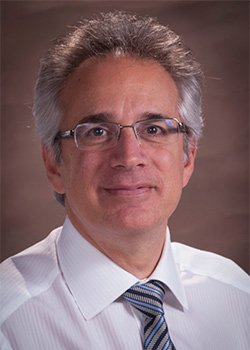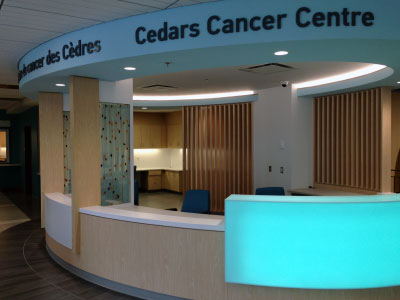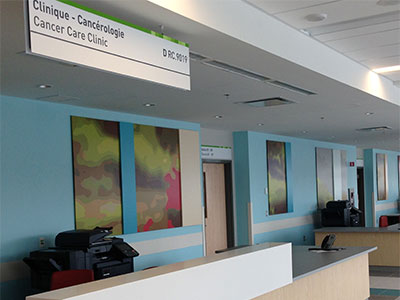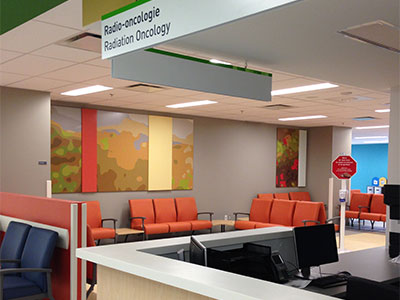Better care, equipment and research possibilities at the new Cedars Cancer Centre
 Dr. Armen Aprikian, director of the McGill University Health Centre Cancer Care mission.
Dr. Armen Aprikian, director of the McGill University Health Centre Cancer Care mission.
Better care, equipment and research possibilities at the new Cedars Cancer Centre At the new Cedars Cancer Centre at the Glen, all physicians, nurses, and support staff in cancer care will be regrouped so that they are centered around the patient,” says Dr. Armen Aprikian, director of the McGill University Health Centre Cancer Care mission. “Today, patients go from one department to another and often times across institutions.”
According to Dr. Aprikian, the patient experience will be much improved, including much more efficiency with consultations with doctors, delivery of treatments, and better communication. “When you are more efficient and improve communication, this equals fewer delays, less errors, and the patients feel better during their trajectory of care. This usually contributes to improved cancer care outcomes.”
Dr. Aprikian gives us a run-down on all of the improvements:



The patient care space and equipment
First, the Cedars Cancer Centre has its own dedicated entrance improving access for our patients suffering from cancer. In the Systemic Therapy Unit, where patients will receive their chemotherapy treatments, the space is much larger than now and there is more light and windows leading to a more comfortable environment. There is also space for patients to have family members with them when receiving treatment. If a patient is quite ill, next to the Systemic Therapy Unit is a mini emergency unit called the Urgent Care Centre, which is quite unique. It is not a fullfledged emergency department but patients who are suffering from their cancer treatments or are having complications, their care can be delivered in the urgent care centre rather than in the general emergency.
The Ambulatory Care Centre, is where patients usually learn about their diagnosis, where discussions are had about the best course of action and where follow ups are conducted. At the moment this is dispersed throughout many different clinics throughout the MUHC hospitals. For example, the radiation oncologists, the medical oncologists and the surgeons all have their own clinics currently. Patients shuffle from one to the other. These are now regrouped in this Ambulatory Care Centre, where we have 40 exam rooms. In this centre our team that looks at scheduling has created a matrix type schedule where the clinicians around a particular disease will be able to see patients around the same time slots. For ex. there will be clinics dedicated to certain cancers, such as breast, urologic, hematologic and so forth. This makes it much easier for patients who need to be seen by multiple specialists in one day.
The Radiation Oncology Centre is truly state-of-the-art and high-tech with a multimillion-dollar investment in new equipment, including seven new linear accelerators, one of which is the Cyberknife M6 that allows for much more precision in radiation therapy, less side effects and less damage to adjacent tissue. And the entire radiation oncology space is much larger than it is now.
The administrative floor is where all the clinicians, pivot nurses (who work in collaboration with the interdisciplinary team to assure patient centered continuity of care), and clinical research personnel, have their offices, which is on the second floor, just one floor above the clinical space in the Cedars Cancer Centre. This physical proximity to each other will improve patient care tremendously. The Palliative Care Day Hospital is also housed on the second floor, as well as the Psychosocial Oncology Unit so everything is close by.
The Pharmacy
One of the big things that is done in cancer care is the delivery of a variety of complex and very expensive drugs to patients. The current pharmacy setup, particularly at the Royal Victoria Hospital, is not good. Great care is delivered despite the limited space and equipment but past accreditation bodies have told us that our pharmacy is not ideal. Finally, we are going to have the best oncology pharmacy in the country! This is a big plus; great for patients and for our pharmacists.
The Research
The Cedar’s Cancer Centre is physically linked to the Research Institute of the MUHC (RI-MUHC) so in terms of innovation, clinical trials and research, the cancer centre is in a privileged position because the clinician interested in doing research will have much less distance to travel and it will be much easier to collaborate with scientists in the RI-MUHC. “I am convinced that cancer care in the new facility will be much better than it already is at the moment,” says Dr. Aprikian. “It will also be better from an academic point of view: teaching, research, clinical trials; all of this will be much stronger in this dedicated cancer centre.”
Cancer Care move timeline
- On April 26, the Royal Victoria Hospital (RVH) Oncology Day Centre will move to the Cedars Cancer Centre at the Glen site
- Also on April 26, the patients on 7 Medical (oncology ward) at the RVH, will move to the new RVH at the Glen site
- In May, some of our new radiation oncology linear accelerators in the Cedars Cancer Centre at the Glen will be turned on to start treating patients
- There will be a two- to three-week period where radiation oncology will be delivered on two sites: the existing units at the Montreal General Hospital (MGH) and the new facility at the Glen
- The MGH Radiation Oncology Unit will eventually shut down the first week of June and the new unit will be fully operational in the Cedars Cancer Centre by June 2015


